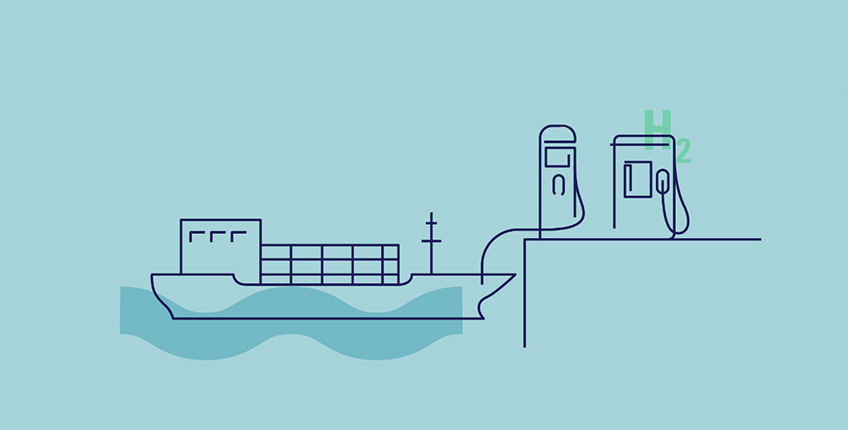A potential study provides insights and recommendations for the development of bunker infrastructures for low-carbon and renewable marine fuels in Germany.
Which ship arrivals can be expected in Germany and what technology mix scenarios are suitable for the defossilisation of the various shipping segments? What supply requirements for bunker infrastructure will result from this in German seaports and inland ports? The potential study on ‘Refuelling infrastructure for low-carbon and renewable marine fuels in Germany’ commissioned by NOW GmbH and conducted by Ramboll consultancy provides answers to these and other questions. The study provides insights and recommendations to the bunkering industry in Germany for the supply of sustainable shipping transport.
In order to achieve the climate targets, a transition towards climate-friendly alternative drives and fuels must also take place in shipping. In addition to measures to reduce consumption, achieving the climate protection targets in shipping is only possible by increasing the use of low-carbon and renewable fuels. Bunker suppliers must therefore adapt their refuelling structures and processes – known as ‘bunkering’ in the shipping industry – to this transition process. The study sheds light on the supply potential and provides recommendations for measures and strategies to expand bunkering capacities for sustainable marine fuels in Germany. Supported by an advisory board of experts from the shipping industry, the bunkering industry, the port industry and environmental organisations, the study examined the following aspects:
- The status quo of port calls and bunker volumes: While port calls have remained constant over the last two decades, bunker volumes of conventional fossil fuels used in maritime shipping in Germany have tended to decline since 2016. Bunker demand in inland shipping, on the other hand, has remained constant since 2007.
- Development of future fuel options: It is anticipated, however, that alternative fuels such as LNG, methanol, ammonia and hydrogen, which increasingly have to be produced from renewable sources, will play an important role in the defossilisation of shipping in the future. Over 90 per cent of the bunker volume in 2050 is expected to be used for these fuels.
- Bunker volume scenarios: The study outlines scenarios for an increasing demand for precisely these fuels, in particular also due to increasingly stringent climate protection requirements for shipping, in combination with a lower volumetric energy density of these fuels compared to conventional fuels (fuel tanks and bunker intensities are increasing).
- Bunker ships and bunker facilities: The analysis shows in particular a need for new bunker ships: By 2050, 13 small, 5 large and 4 very large bunker vessels will be needed in the North Sea alone to supply the expected ship calls at German seaports, while 22 small, 2 medium and 3 large bunker vessels will be needed in the Baltic Sea.
Kurt-Christoph von Knobelsdorff, CEO and spokesperson for NOW GmbH: “The pressure on the shipping industry to make its contribution towards tackling climate change is growing. Ever stricter regulations concerning the reduction of CO2 emissions require not only efficiency measures but also the increasing use of low-carbon and renewable marine fuels. The study provides guidance for the development of corresponding bunkering infrastructures in Germany. The development of a robust bunker market for climate-friendly marine fuels can become an attractive service offering for German ports in international competition.”
Downloads:
Short version of the study (English)
Full version of the study (German)
About NOW GmbH:
NOW GmbH has been supporting the federal government since 2008 in its climate and industrial policy goals. Among the tasks of the federally-owned company is to develop, support and evaluate funding programmes for climate-neutral mobility and energy supply. The NOW GmbH experts supervise projects in hydrogen fuel cells, batteries and renewable fuels; they reimagine mobility and fuels for cars, buses, trains, commercial vehicles, ships and airplanes – and support the establishment and further development of charging infrastructure as well as hydrogen refuelling stations for cars and trucks. More information on NOW can be found here.


